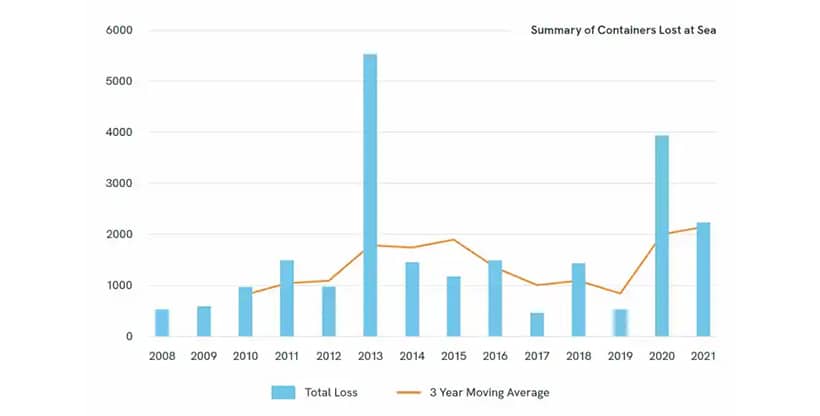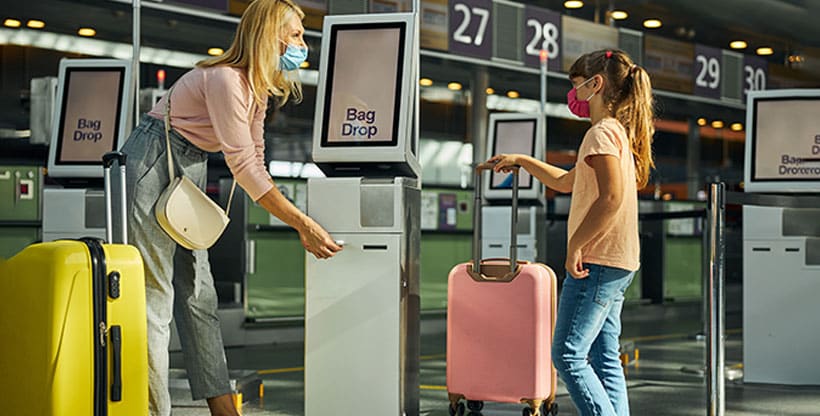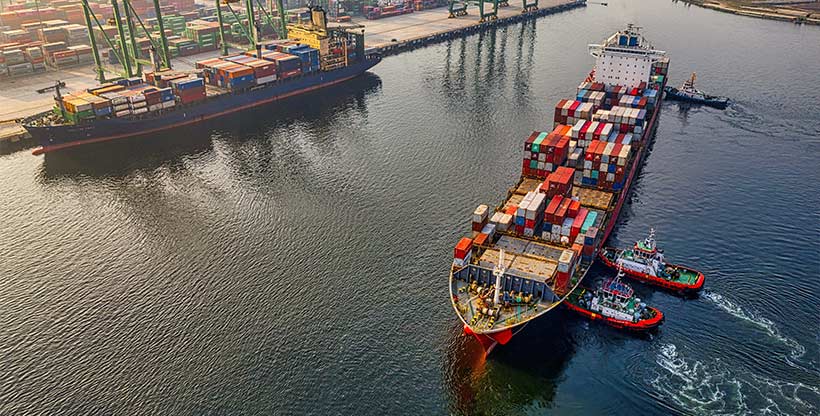Individuals
Moving to Another Country: What to Do With Your Stuff

Moving is widely considered one of the most stressful life events, ranking alongside death of a loved one and divorce. There is an added layer of complication when that move is overseas. How much does it cost to move your stuff to another country? Is it worth the cost and trouble? How do you ship your belongings internationally? Are there alternatives?
Relax, and let us guide you through the logistics of moving your household to another country. We will help you work through different aspects of deciding what to do with your stuff by exploring the following considerations:
- Get Organized
- Factors to Consider Before Moving
- What to Do Before Moving Your Stuff Overseas
- Shipping Your Belongings to Your New Country
Get Organized
Organization is the first crucial step to a successful move. Make a moving checklist that details all applicable steps including comparing moving quotes, making a budget, researching insurance, packing, learning Customs regulations, etc.
Lists are proven to assist with focus and productivity, according to the personal development website, MindTools.com. Lists enable you to “experience less stress, safe in the knowledge that you haven’t forgotten anything important. [Y]ou’ll focus your time and energy on high-value activities, which will mean that you’re more productive…”
Everyone’s moving process will be different depending on resources, destination, and lifestyle, but there are some common steps that all expats will need to consider as they move (i.e., vaccinations). Please see our moving abroad checklist as a handy reference.
Factors to Consider Before Moving
Some expats, like certain government employees, have the benefit of a move paid for by their organization; however, many people, such as retirees, must arrange for the shipment of their belongings on their own.
If you’re in the latter category, start planning your move considering these factors:
Moving Budget
Moving is costly, whether it’s domestic or abroad. According to global moving company, International Van Lines, these are the average costs of moving internationally:
| Continent | 1-2 Bedroom Home | 3-4 Bedroom Home | 5-6 Bedroom Home |
| Europe | $3,500-$7,000 | $8,000-$12,000 | $11,000-$17,000 |
| Asia | $3,900-$8,200 | $8,500-$13,000 | $12,000-$17,500 |
| Australia | $4,000-$9,000 | $8,700-$12,500 | $13,000-$18,000 |
| Africa | $4,500-$10,000 | $9,000-$15,000 | $14,000-$18,500 |
| South America | $3,800-$8,800 | $8,500-$13,600 | $11,800-$16,000 |
Costs for Moving Your Stuff Internationally Can Increase with These Factors:
- Moving during April to September (it can also decrease during the off season)
- Extra services such as furniture assembly and packing services. Self-packing can “reduce the cost by about 10%,” according to International Van Lines.
- Moving “specialty items” such as antiques or pianos. Certain items may require crating which can range from $200 to $2,000.
- Customs fees and taxes. The exact fee depends on your destination, so do your research to ensure you factor this into your budget.
- Terminal handling charge (a cargo-handling fee charged by the terminal)
- Pickup and drop-off points. Some movers offer every configuration of options: door-to-door shipping, door to port, port to door, or port to port. Door-to-door typically costs more, but it that option prevents you from having to deal with Customs regulations.
- Insurance. This should be considered a necessary expense, as the cost of protecting your entire household pales in comparison to the cost of losing everything in an accident. Shipping by sea is largely considered safe, with relatively few containers lost at sea each year; however, it does happen. Vessel fires, capsizing, and overboard containers are inherent risks of sea shipping. Shipping and Freight Resource’s chart shows container loss spiked in 2013 and 2020. Check your policy limits to ensure it’s enough to cover your household, and if it’s not, consider purchasing additional international personal property insurance to cover the gap so you aren’t left vulnerable.

Duration of Your Stay Abroad
Various events take us abroad—work, school, retirement, adventure. Often, the reason determines the timeline. For example, if you are moving to attend school, you will likely have a finite amount of time overseas, and it wouldn’t benefit you to move your household goods.
If you are planning a permanent relocation, the cost of moving becomes necessary. It’s best to only move items that can’t be replaced, such as things with sentimental value because it’s typically more cost-effective to sell your belongings in your home country and apply that money towards replacements, especially with big-ticket items, like TVs and appliances.
Also, renting may be a more cost-effective solution if your accommodations overseas are not furnished. See the section below on renting for more details.
What is Necessary to be Moved to Your New Country
Cost is not the only factor to consider. The less stuff you take abroad, the smoother your move will be. International relocations can be tricky with shipping and Customs regulations, so lightening your load can help lower your moving stress. If an item is irreplaceable, such as family heirlooms, determine if you’re willing to take the risk of the item being lost, stolen, damaged in transit, or even turned away or seized at Customs. If you’re not willing to take that risk, you may want to store your item or leave it with someone while you live abroad.

Your Lifestyle Overseas
Are you a digital nomad who will be surfing from country to country on relatively short visas? In that case, it makes sense to travel light. Either sell or store your items in your home country, whichever makes sense. If your items are relatively dated or inexpensive, the cost of storage may not be worth it.
Should You Ship Your Car?
You may or may not need a car where you’re heading. First, consider the transportation at your destination. Travel guides, such as Lonely Planet, are a good resource, as they usually detail transportation by region and/or city. If you do need a car, you’ll first want to research the legal requirements and Customs fees. You’ll also want to make sure you have the right international car insurance policy, to ensure you will be fully covered driving overseas. This information allows you to do a cost-benefit analysis to determine if it’s worth it to ship your car abroad.
“Shipping a personal vehicle internationally can cost from $1,000 – $5,000 for standard ocean transport or $5000 – $40,000 for air transport.”
– Source: shipyourcarnow.com
You may face additional fees when importing your car, so ensure you check those fees and licensing requirements for your new country in advance. Depending on your length of stay, you may want to sell your car and apply that money to one you buy abroad.
If you do decide to ship your vehicle, Ship Your Car Now recommends “that you list your vehicle as far in advance as possible to provide us with enough time to locate a driver for your route.” Make sure the transport company is bonded and insured and get the appropriate insurance for your personal stuff and car to cover any gaps during transport.
Renting Household Items Abroad
Renting not only saves money, but it reduces your moving stress. Additionally, importing goods across international borders can be tricky. With several providers to choose from online, there are plenty of rental companies, like Cort Global, available in over 80 countries.
The Bottom Line
Most experts agree, whether your relocation is temporary or permanent, it’s best to only take what’s essential. It’s almost always easier and more cost-effective to replace and/or rent things at your destination.
“Research what is available at…the place where you’re going so that you understand what is worth bringing and what is really not a good use of your resources and your budget,”
says Kathleen Peddicord of Live and Invest Overseas, an advice hub for expats
Parting with your possessions can be understandably emotional and letting go is a process. Peddicord encourages those moving abroad to take some time to determine what’s truly essential.
For those items you choose to ship your stuff overseas, we will cover the shipping process in this guide below.
What to Do Before Moving Your Stuff Overseas

Check the Baggage Limit
If you are flying and you choose to rent or buy replacement items at your destination, you can opt to pay for extra and/or overweight luggage and tow your essentials with you.
During the busy travel season, passengers may be limited to two suitcases, while in the low season, they may be allowed more for an extra fee. Check the airline’s restrictions as you plan your trip. Note that seasonal restrictions may be buried in the fine print, so if you’re unsure, contact the airline directly.
Check Customs Regulations
Even if you are moving to Mexico, moving your household goods isn’t as easy as driving across the border in a rental truck. Importing your goods to another country requires paperwork, per Customs regulations, and those rules vary between countries. It is essential to know what is allowed, what’s not, and the required paperwork. Also, ensure you research fees, as you don’t want to be blindsided at the border.
If your budget allows, it’s best to hire a reputable professional to help you navigate Customs and arrange the necessary paperwork and requirements, as this can be a complicated process, made even more complicated by a language barrier in some cases.
Pare Down or Store Non-Essential Items
Now that you’ve decided what’s essential, it’s time to take care of your non-essential belongings. Moving abroad is a good time to purge all that you don’t need, and it will lighten your moving burden. To get rid of your items, you can:
- Store your belongings in a storage facility. Facilities on the outer edges of cities and towns are often cheaper.
- Leave your items with a friend or family member. Just be aware that a three-month trip can easily turn into three years, so as a courtesy, make sure you have a backup plan for your items.
- Sell your items. Have a yard sale or list your items on re-sell websites such as OfferUp, Facebook Marketplace, Mercari, Poshmark, or eBay. You can apply this money towards purchasing new items in your new country.
- Have an estate sale company sell your items.
- Donate your non-essential items to charitable organizations.
Should You Move Your Pets?
Some consider pets family, so you may not want to leave them behind. Rules vary between countries, and rules about importing live animals can be particularly strict. A good place to start is by ensuring your pet’s vaccinations are up to date and gathering those records. Consult your destination country’s embassy about its rules about bringing pets into the country to learn the required steps and if it’s legal. Be advised, there may be a quarantine period for your pet.
Rules are subject to change—sometimes quickly—and information is not always updated on websites in a timely manner. It’s a good idea to do research as you’re planning your international move and then confirm the rules closer to your travel date.
Shipping Your Belongings to Your New Country
Now that you’ve pared down your items to essentials, let’s talk about shipping your belongings internationally. These are the factors to consider when moving your stuff:
Give Yourself at Least 6 Months to Plan Your Move
It doesn’t matter how meticulously you plan, there will always be surprises with an international move. Give yourself a cushion of time to address any hiccups you encounter along the way. Experts from various authorities, including Forbes, agree you should give yourself at least six months to plan. If your move is more complex, like a permanent relocation, you may want to begin even earlier.
“The earlier you get started, the easier it will be to address any surprises or issues that may arise. Start at least six months before your move (if you have the time). ”
– Forbes
Use that time to compare the moving quotes for the best deal, but make sure to balance price with reputation. According to the U.S. Department of Transportation, there are:
“more than 5,662 household moving companies registered… [C]onsumers need to be aware of how to avoid those who are not [reputable].”
Websites like the Better Business Bureau and TrustPilot are good indictors of a company’s reliability.

Air vs. Sea
Shipping by sea is 12-16 times cheaper than air, according to a World Bank report, and it’s much more environmentally friendly if that’s a priority for you. Both methods are equally safe, though sea cargo has a bit of a rougher ride, so use good packing practices, detailed in the next section.
Shipping by air takes days (granted the cargo clears all the necessary Customs checks), whereas sea freight can take weeks. Usually, if you plan ahead, this is a minor inconvenience.
Handle With Care
International moves mean your items have a long way to go, so make sure the journey is safe for them. Cargo traveling by sea especially needs to be packed well, as it has the potential to move around more during transport, so if you choose to self-pack, ensure your items are well protected with bubble wrap and good packing methods. This video tutorial from an antiques dealer shows how to protect fragile items during shipment.
Insurance Across Borders
Whether you are in the military, a government employee, or an expat moving on your own, you will want to consider purchasing insurance to close gaps in your coverage. Your organization may provide insurance or moving companies may tie this in with your contract, but often those policies are not sufficient to cover your entire household, leaving you financially liable for the gap in coverage.
For example, if your policy limit is $25,000, and your items are worth $75,000, you’ll be at a loss of $50,000 should you need to replace your household goods. An average of 1,382 containers are lost at sea each year, according to the World Shipping Council, so it’s smart to pay for a policy that provides peace of mind.
“If you can afford to pay for expanded moving coverage, we recommend it. Paying a small premium to insure all aspects of your move is well worth it. For those with high-value items that need additional coverage, purchasing insurance from a third party is a good idea,”
says ConsumerAffairs, an organization that empowers and protects buyers
Choose an international personal property policy or worldwide renters insurance that protects against all risks, has sufficiently high limits, and covers any high-value items you may have. Also, consider your insurance provider’s replacement policy. Not all insurers will pay full replacement cost for your items, meaning they will reimburse you for the depreciated value of your items. If this is an important factor, consider a policy that meets your needs. You can get an instant quote by completing this online form.

Take an Inventory of Your Stuff
Moving abroad is a major mental adjustment, so when you start unpacking, you’ll probably want to spend your time doing better things than considering whether you packed four wine glasses or six. Make an inventory of your belongings to ensure everything arrived safely. This will make your claims process easier in the event you need to file one.
Give It Time—Research and Plan Your Move Thoroughly
When planning a move, remember the proverb “an ounce of prevention is worth a pound of cure.” Moving your stuff abroad is a huge undertaking, and the biggest favor you can do yourself is giving it enough time to thoroughly research and plan.
We wish you and your family safe and happy international adventures. Visit our online resource hub for helpful expat resources including what to consider when you are planning an international move.
Bon voyage!
Related Helpful Content
Find tips, trends, and perspectives to help you confidently make decisions and navigate challenges internationally with peace of mind. Read how you can live, operate, and manage risks abroad.
An Expat’s One-Stop Guide to Driving in Ireland
Steering Through Spuds and Sheep: Tips for Driving, Requirements, Traffic Rules,
Tips for Driving in France: an Expat’s Guide
Driving in France is a great way to explore the country’s
12 Best Scenic Drives & Road Trips in the UK & Ireland
For expats in the United Kingdom or business travelers who wind